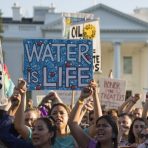Water, Indigenous Women’s Health, and Environmental Violence (Water Conversations feat. Karen Lawford))
Water, Indigenous Women’s Health, and Environmental Violence (Water Conversations feat. Karen Lawford))
Categories: General, Indigenous, Lectures and Seminars, Panel Discussions | Intended for Alumni, Anyone, Carleton Community, Current Students, Faculty, Prospective Students, Staff/Faculty

3235 Mackenzie
1125 Colonel By Dr, Ottawa, ON
Contact Information
Christiane Mineau, (613)520-2600 x2516, christiane.mineau@carleton.ca
Registration
Cost
$0
About this Event
Host Organization: The Global Water Institute
More Information: Please click here for additional details.
The Global Water Institute (GWI) would like to invite you to the third installment of Water Conversations, our brown bag lunch series. These informal talks aim to help us make connections, better understand the water issues unfolding around the world, and familiarize us with the type of water research that Carleton faculty and students are undertaking so that we can collaborate better and successfully team up for larger projects. Please bring your lunch and we will serve the drinks and cookies.
Our December speaker is Karen Lawford, Aboriginal Midwife and instructor in the Carleton School of Indigenous and Canadian Studies. Please feel free to share this invitation with other interested parties, and RSVP to me, Christiane Mineau (christianemineau@cunet.carleton.ca) by December 12th.
Abstract: Indigenous ecological ways of knowing position water as more than a commodity or a resource related to extractive industries. Water is intertwined with Indigenous peoples’ identity, reproductive health, and relationships with the land. The first environment for all humanity is woman and water is essential for the growth and development of the baby during pregnancy. This relationship explains why water and women are so very important to Indigenous peoples. The purpose of my presentation is to map out the linkages between water, Indigenous women’s health, and environmental violence. I will use the United Nations Declaration on the Rights of Indigenous Peoples (UNDRIP) to frame this short presentation.